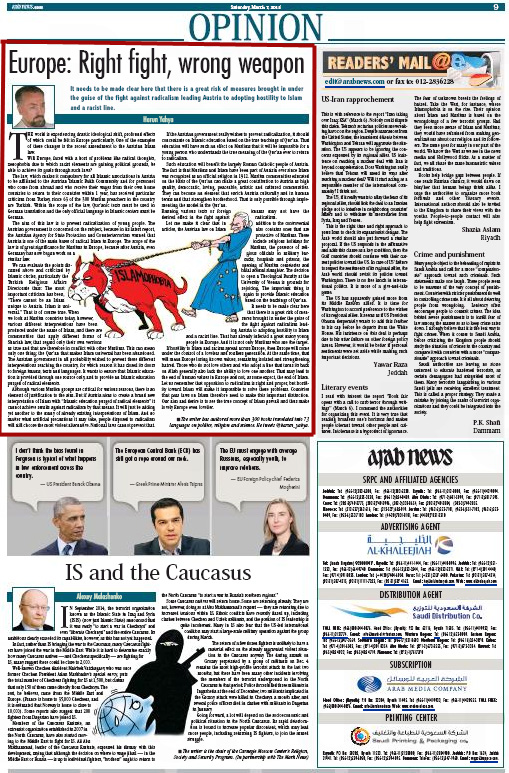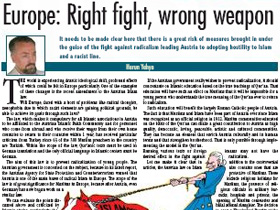
The world is experiencing drastic ideological shift, profound effects of which could be felt in Europe particularly. One of the examples of these changes is the recent amendment to the Austrian Islam law.
Will Europe, faced with a host of problems like radical thoughts, xenophobia due to which racist elements are gaining political grounds, be able to achieve its goals through such laws?
The law, which makes it compulsory for all Islamic associations in Austria to be affiliated to the Austrian Islamic Faith Community and for personnel who come from abroad and who receive their wages from their own home countries to return to their countries within 1 year, has received particular criticism from Turkey, since 63 of the 300 Muslim preachers in the country are Turkish. Within the scope of the law, Qur’anic texts must be used in German translation and the only official language in Islamic centers must be German.
The aim of this law is to prevent radicalization of young people. The Austrian government is concerned on the subject, because in its latest report, the Austrian Agency for State Protection and Counterterrorism warned that Austria is one of the main bases of radical Islam in Europe. The scope of the law is of great significance for Muslims in Europe, because after Austria, even Germany has now begun work on a similar law.
We can evaluate the points discussed above and criticized by Islamic circles, particularly the Turkish Religious Affairs Directorate thus: The most important criticism has been, “There cannot be an Islam unique to Austria. Islam is universal.” That is of course true. When we look at Muslim countries today, however, various different interpretations have been produced under the name of Islam, and there are communities that apply different forms of Shariah law, that regard only their own versions as true and that are therefore in conflict with other Muslims. This can mean only one thing; the Qur’an that makes Islam universal has been abandoned. The Austrian government in all probability wished to prevent these different interpretations reaching the country, for which reason it has closed its doors to foreign imams, texts and languages. It wants to ensure that Islamic education is provided through one source only, and to provide an Islamic education purged of radical elements.
Although various Muslim groups are critical for various reasons, there is an element of justification to the aim. But if Austria aims to create a brand new interpretation of Islam with “Islamic education purged of radical elements” it cannot achieve results against radicalism by that means. It will just be adding yet another to the many of already existing interpretations of Islam. And no matter what artificial precautions it may take, people disposed to radicalism will still choose the most violent alternative. National laws cannot prevent that.
If the Austrian government really wishes to prevent radicalization, it should concentrate on Islamic education based on the true teachings of Qur’an. That education will have such an effect on Muslims that it will be impossible for a young person who understands the true meaning of the Qur’an ever to return to radicalism.
Such education will benefit the largely Roman Catholic people of Austria. The fact is that Muslims and Islam have been part of Austria ever since Islam was recognized as an official religion in 1912. Muslim communities educated on the basis of the Qur’an can make a great contribution to Austria as high quality, democratic, loving, peaceable, artistic and cultured communities. They can become an element that enrich Austria culturally and in human terms and that strengthen brotherhood. That is only possible through implementing the model in the Qur’an.
Banning various texts or foreign imams may not have the desired effect in the fight against radicalism.
Let me make it clear that in addition to the controversial articles, the Austrian law on Islam also contains ones that are protective of Muslims. These include religious holidays for Muslims, the presence of religious officials in military barracks, hospitals and prisons, the opening of Muslim cemeteries and halal animal slaughter. The decision to open a Theological Faculty at the University of Vienna is grounds for rejoicing. The important thing is again to provide Islamic education based on the teachings of Qur’an.
It needs to be made clear here that there is a great risk of measures brought in under the guise of the fight against radicalism leading Austria to adopting hostility to Islam and a racist line. That has already infected a great many young people in Europe. And it is not only Muslims who are the target.
If hostility to Islam and racism spread across Europe, then Europe will come under the control of a loveless and soulless generation. At the same time, that will mean Europe losing its own values, remaining isolated and strengthening hatred. Those who do not love others and who adopt a line that turns its back on Allah generally also lack the ability to love one another. That may lead to the end of human values in Europe and not, as some expect, the end of Islam.
Let us remember that opposition to radicalism is right and proper, but hostility toward Islam will make it impossible to solve these problems. Countries that pass laws on Islam therefore need to make this important distinction. Our aim and desire is to see the true concept of Islam prevail and thus make lovely Europe even lovelier.
Adnan Oktar's piece on Arab News:


